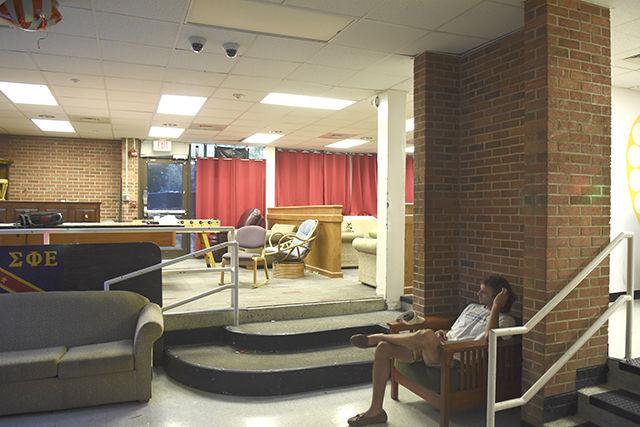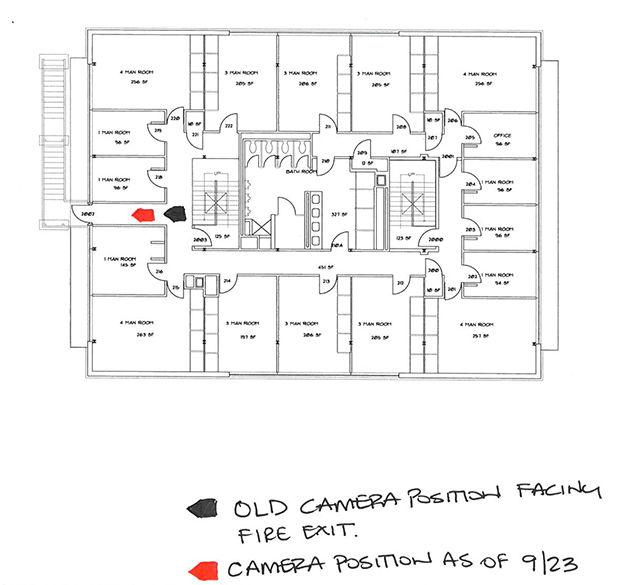When the brothers at Sigma Phi Epsilon walked through the door to their house in Greek Court for the fall semester, they were met by a camera staring back at them.
As they moved through their common area, a sprawling multi-level party and communal area complete with a stage, sofas, La-Z-Boys, pool and foosball tables and a kitchen, they counted five more black orb-encased cameras — six in total. For all they knew, the cameras were recording everything in every direction and could be accessed at any time by Fraternity and Sorority Life (FSL), NC State University Police and NC State’s security provider, Security Applications and Technology (SAT).
During the following weeks, this area promised to be packed with new recruits looking to make a name for themselves and later would have the curtains pulled for their top secret induction rituals. However, because of the cameras, the brothers avoided the communal area all together, opting to stay in their rooms to avoid the feeling of being under constant surveillance from university administration.
“It’s very unnerving that someone we don’t know, some stranger, can watch us without us knowing,” said Charlie Gray, a senior studying political science and chapter president for Sigma Phi Epsilon, in August. “Brothers are afraid to be themselves.”
The brothers described feeling they were being treated with increased suspicion for political reasons and that some fraternities were being selectively targeted over others. Some said they had reason to believe there was a police officer or security technician watching them through the cameras in real time.
In fact, none of this is true, but the distrust between many members of Greek Life and FSL is clear.
“We don’t live monitor, period”
The cameras were installed as part of a campus wide security upgrade spelled out in the 2015-19 Security Master Plan in spring 2015 which would bring Greek Court housing up to the standards shared by all other university owned properties by summer 2016.
This plan is intended to provide a more accurate audit of those accessing university owned properties as frequent turnover in the student population has created more and more opportunities for people to access buildings without the knowledge of residents or university staff, according to Scott McInturf, director of Security Applications and Technologies.
The plan asked that Greek organizations be brought up to the same standard as the rest of the University Housing properties. This included replacing key pads with a card access system, installing cameras to focus on perimeter doors, sending chapter rosters (along with names of other essential personnel) to SAT to ensure that only current members have access through their University ID and that privately-owned Greek housing at least meet university security standards.
McInturf said that SAT’s role in relation to the cameras is similar to that of an electrical power company which doesn’t constantly check on individuals’ access to power, but is made aware when something goes wrong.
“We don’t live monitor, period,” McInturf said. “What we do is keep the systems running.”
McInturf said that the recording of footage is purely forensic, meaning that it will only be viewed upon request from the NC State University Police Department as part of an investigation.
Fraternity and Sorority Life do not have access to the footage in any capacity.
Many fraternity brothers were also convinced that the cameras could rotate in 360 degrees and record sound. Because of this, brothers at Kappa Alpha complained to FSL that a camera in the hallway of their living quarters could see directly into multiple bedrooms and could potentially see brothers moving in and out of the bathroom.
Joshua Welch, associate director of Fraternity and Sorority Life, said that the cameras do not have the ability to rotate, and though there is a port for audio recording, it requires the installation of a microphone, which the university has not and will not purchase.
The Technician was allowed to view screenshots of the views of the cameras, though could not be immediately provided with images for the purpose of sharing. Prior to being zoomed in, each camera was focused on the doors alone, able to identify faces at most eight feet in front of the door and roughly five feet from the sides of the doors.
The camera in the KA hallway which created concern that the cameras were recording video of private areas was only able to see the walls of a short hallway leading to a fire escape door. Its physical position made it highly noticeable when walking through the private areas of the KA house and made the brothers feel like they were being watched, according to Welch.
Greek Village Master Plan
The Security Master Plan coincides with the university’s Greek Village Master Plan, which called for demolition of all 15 houses to be replaced in phases by summer 2021.
According to Welch, only three houses out of 15 have not been upgraded to meet the new security measures because they are scheduled to be demolished next summer.
“Rather than spending the money to put the cameras and card readers into those properties just for them to be torn down, we asked for permission to delay [putting cameras in] those three properties,” Welch said.
Section 4.1 of NC State’s policy regarding Closed Circuit Television, RUL 05.06.03, states that, “only sworn law enforcement officers and representatives of Security Applications and Technologies may retrieve CCTV recordings, and then only for the purpose of investigating possible criminal activity or misconduct.”
The policy continues to say that, “any camera installed in a residential housing area will provide no greater view than what is available with unaided vision in common spaces.”
All dorms and campus buildings have been under this policy since 2011.
Cocaine arrest
The suspicion toward the cameras and FSL among the Greek community at large led back to a rumor that cameras were used to arrest multiple members of Sigma Alpha Epsilon on drug charges relating to cocaine.
Paul Cousins, director of the Office of Student Conduct, said that SAE was indeed investigated for drug violations in August in the time since the cameras were installed, but he was certain that cameras were not the method used to make the arrests.
“There is no indication in the record that security cameras were utilized in either of these situations,” Cousins said in an email.
The case remains open at press time.
Miscommunication
Chapter presidents, Inter-Fraternity Council (IFC) leadership and FSL met in March 2016 to discuss the increasing security measures, but the details of the plan were hazy, according to Gray, which fueled conspiracy theories about the university’s intentions.
IFC President Harrison Jenkins declined to comment on the contents of these meetings, and President of the Panhellenic Association Meredith Mason did not respond to requests for comment.
“It’s peace of mind,” said Ben Craver, co-housing manager and chaplain for SigEp. “We’re walking in everyday and seeing a black circle staring at us.”
Two of the cameras in SigEp’s house are positioned within the same ceiling panel in the common area, which initially gave the brothers the impression that there was an excessive amount of visibility for the cameras. These cameras only pointed at the two exterior doors to the common area.
Gray said that his initial impression of the plan was that there would only be outdoor cameras at the entrances, which is why he was shocked to see six cameras situated in key areas throughout their house.
Welch said the cameras were put inside so that the cameras could capture a person’s face as they were entering the building and that he sent screenshots of the cameras’ views on July 10 to another student — not Gray — who had requested them, asking for feedback. He didn’t receive a response until Aug. 29, the day before a scheduled meeting to clear up any lingering concerns.
That meeting followed a summer of little contact and resulted in a compromise: Welch agreed to have the cameras zoomed in to make sure that no unnecessary areas were visible, and that the adjustments would be made with Gray present.
“We didn’t want them to see any more than they needed to,” Gray said.
Yet this change didn’t come for over a month until Gray reached out to Campus Reform, where the story was later picked up by Total Frat Move and Reason (who all agreed that the university’s sole intention was to spy on the fraternities). Welch then moved quickly without Gray’s knowledge, zooming in the cameras and threatening to refer a student who covered them up to student conduct, according to Gray.
Colin Beamer, a senior studying political science and chief of staff for the student body president, acknowledged the tension but downplayed the seriousness of it, attributing it all to miscommunication.
“I think it goes back to some of them worrying that some of the people in the administration don’t see Greek Life in a positive light,” Beamer said. “If we had all come to the table sooner we could have worked this out.”
A floor plan of the private quarters of the Kappa Alpha house in Greek Court. The black arrow shows the position and orientation of the camera which was in the center of the private hallways and could be seen from several of the brothers' rooms. The red arrow shows where the camera was moved on Sept 23 to make the brothers more comfortable, though this had little effect on the view from the camera which was always directed at the door at the end of the hall.









